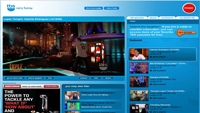Adobe Pass simplifies subscriber authentication

The ability to handle video content as digital files has led to a number of distribution advantages that enable owners to cost-effectively get their content to viewers and for consumers to view clips on a variety of platforms. This has become known as TV everywhere, and these days, every multichannel video service provider has a strategy to enable subscribers to consume content as soon after an exclusivity window has closed as possible.
However, while consumers might want that content no more than a click away, securing the correct authentication to make that possible for a specific user is easier said than done. It often requires a complex series of computer code commands sent to the right device at the right time across a bandwidth-challenged network. What’s needed is a fast enterprise-level authentication process that releases content as soon as it’s requested.
Adobe Systems, which has increased its presence in the distribution of content, thinks it has the solution to make this complex process invisible for owners/distributors and a one-touch experience for viewers, regardless of the device. After nearly two years of development, the company has officially announced Adobe Pass, a new hosted service that enables pay-TV subscribers to easily access content from their provider across multiple websites with just one sign-in.
Supporting both Flash and HTML5 players, Adobe Pass is free for multichannel video service providers and carries a performance-based cost for content owners. It enables providers to securely deliver their high-quality content to a wider range of platforms, such as smart phones, tablets and Internet-connected TVs. Under a single validation, a subscriber could also begin watching a movie on one device and continue on another without interruptions. The Flash Access client-side security built into the Flash Player (v.10.1 and higher) enables fraud prevention by binding the user to their device so limits can be set on devices per household account. Flexible business rules in Adobe Pass also allow complete control for content owners.
One such content owner, Turner Broadcasting in Atlanta, has been a beta tester for the Adobe Pass service from the beginning and recently deployed it live as its authentication system across several of its sites, including TBS and TNT. Executives at Turner said Adobe Pass helps streamline the process for confirming subscribers' eligibility for programmers and distributors.
“We were looking for the industry in general to come with some solutions that not only made our lives easier, but also other programmers (content owners); this isn't just a Time Warner problem,” said Mike Wise, vice president of multiplatform distribution technologies at Turner Broadcasting. “We want this platform to be a success not just for us, but for the entire industry, so everyone can benefit. The Adobe Pass service is a great way for both programmers and distributors to get content to consumers faster.”
The integration of the service was smooth, according to Wise, adding that it used to take Turner several weeks to integrate its authentication process with a multichannel video service distributor. With Adobe Pass, that time has been reduced to several days for service providers already signed on to Adobe Pass, including Comcast, Cox Communications, Dish Network and Verizon. More will follow this summer, according to Todd Greenbaum, senior product manager for Adobe Pass.
The professional video industry's #1 source for news, trends and product and tech information. Sign up below.
Adobe Pass is a service hosted by Adobe, but, Greenbaum said, Adobe doesn’t have access to customer ID data. The goal is to help content owners and providers quickly adjust to a changing market and take advantage of the promise of TV everywhere. According to Greenbaum, bandwidth providers such as BrightCove and Limelight will bundle Adobe Pass with their standard video-streaming packages.
“The main idea is to make this concept of TV everywhere an easy and enjoyable experience for everyone involved,” Greenbaum said, adding that it could be integrated into an existing asset management system, such as Adobe's Flash Access or other software. An Adobe Pass SDK will also be available soon for programmers to customize the service. “This includes an easy, single sign-on solution so consumers don't get frustrated when they want to request a piece of content.”
For content owners and subscription service organizations, Adobe provides a free API that multichannel video service providers download once to establish the link to their authentication system. Adobe also takes care of the direct integration with all of the various multichannel video service providers to establish that authentication.
When a consumer clicks on a file for viewing, a message is automatically sent to an Adobe server for authentication. An on-screen prompt asks consumers what provider they are signed up with, and Adobe makes the connection. Once the multichannel video service approves the transaction, the content can then be streamed to any platform that they are authorized for. After this process happens once, Adobe can embed a small token within their device so they don’t have to be reauthenticated every time they request new content.
“As the user searches the Web, we can go behind the scenes back to their service provider and say, 'Does this user have permission to view this content?' If the answer is yes, we can continue to accumulate authorizations so from a user perspective, the content just plays,” Greenbaum said.
For service providers, Adobe Pass is all about helping content owners get their shows to market quickly and with the least amount of hassle for the consumer. The point is to protect licensing agreements while allowing providers to generate new revenue by serving more content.
“This about providing an easy way to watch video to encourage more video consumption,” Greenbaum said, “as well as making implementation as easy as possible for service providers. All of the multichannel video service providers we talk to want the authentication process to be as invisible (to everyone) as possible. We've worked hard to get to where we are today, but I think Adobe Pass will catch on in a big way.”
With only about three weeks to get an operator's log-in system talking to Adobe's APIs, Adobe Pass is attempting to make the authentication process automatic for the provider, which could get companies interested. The platform can also be used for parental control ratings, geolocation information for targeted ads and content, and the authentication of multiple devices within a single household.
“The online video space is extremely important to Adobe, and we saw an opportunity to leverage our unique advantage with Flash and create a better experience that will hopefully get more people to consume more content across more devices,” Greenbaum said. “To do this, it is important to support the entire ecosystem within the content distribution chain and make sure it works for everyone.”
